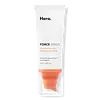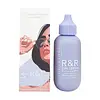What's inside
What's inside
 Key Ingredients
Key Ingredients

 Benefits
Benefits

 Concerns
Concerns

 Ingredients Side-by-side
Ingredients Side-by-side

Zinc Oxide
Cosmetic ColorantWater
Skin ConditioningCaprylic/Capric Triglyceride
MaskingPropanediol
SolventC13-15 Alkane
SolventC15-19 Alkane
SolventButyloctyl Salicylate
Skin ConditioningBis-Diglyceryl Polyacyladipate-2
EmollientOctyldodecanol
EmollientCetearyl Alcohol
EmollientPolyacrylate Crosspolymer-6
Emulsion StabilisingHippophae Rhamnoides Oil
EmollientBetaine
HumectantMica
Cosmetic ColorantMusa Sapientum Leaf Extract
Skin ConditioningSilica
AbrasiveCoco-Glucoside
CleansingArachidyl Alcohol
EmollientXanthan Gum
EmulsifyingPolyhydroxystearic Acid
EmulsifyingPolyglyceryl-3 Polyricinoleate
EmulsifyingIsostearic Acid
CleansingLecithin
EmollientPolyglyceryl-3 Lactate/Laurate
CleansingPolyglycerin-3
HumectantBisabolol
MaskingTocopherol
AntioxidantBehenyl Alcohol
EmollientCaprylhydroxamic Acid
Sodium Dilauramidoglutamide Lysine
HumectantCitric Acid
BufferingArachidyl Glucoside
EmulsifyingEctoin
Skin ConditioningNiacinamide
SmoothingMaltodextrin
AbsorbentSodium Citrate
BufferingSodium Phytate
Terminalia Ferdinandiana Fruit Extract
AntioxidantLactobacillus Ferment
Skin ConditioningTin Oxide
AbrasiveGlucose
HumectantLeuconostoc/Radish Root Ferment Filtrate
AntimicrobialCI 77492
Cosmetic ColorantCI 77491
Cosmetic ColorantTitanium Dioxide
Cosmetic ColorantZinc Oxide, Water, Caprylic/Capric Triglyceride, Propanediol, C13-15 Alkane, C15-19 Alkane, Butyloctyl Salicylate, Bis-Diglyceryl Polyacyladipate-2, Octyldodecanol, Cetearyl Alcohol, Polyacrylate Crosspolymer-6, Hippophae Rhamnoides Oil, Betaine, Mica, Musa Sapientum Leaf Extract, Silica, Coco-Glucoside, Arachidyl Alcohol, Xanthan Gum, Polyhydroxystearic Acid, Polyglyceryl-3 Polyricinoleate, Isostearic Acid, Lecithin, Polyglyceryl-3 Lactate/Laurate, Polyglycerin-3, Bisabolol, Tocopherol, Behenyl Alcohol, Caprylhydroxamic Acid, Sodium Dilauramidoglutamide Lysine, Citric Acid, Arachidyl Glucoside, Ectoin, Niacinamide, Maltodextrin, Sodium Citrate, Sodium Phytate, Terminalia Ferdinandiana Fruit Extract, Lactobacillus Ferment, Tin Oxide, Glucose, Leuconostoc/Radish Root Ferment Filtrate, CI 77492, CI 77491, Titanium Dioxide
Water
Skin ConditioningCaprylic/Capric Triglyceride
MaskingC12-15 Alkyl Benzoate
AntimicrobialPropanediol
SolventTridecyl Salicylate
Skin ConditioningPolyglyceryl-4 Diisostearate/Polyhydroxystearate/Sebacate
EmulsifyingMethylheptyl Isostearate
Skin ConditioningJojoba Esters
EmollientNiacinamide
SmoothingNylon-12
Methylpropanediol
SolventSilica
AbrasiveRubus Idaeus Seed Oil
EmollientTremella Fuciformis Sporocarp Extract
AntioxidantAllantoin
Skin ConditioningBisabolol
MaskingOryza Sativa Bran Extract
Skin ConditioningHelianthus Annuus Extract
EmollientRosmarinus Officinalis Leaf Extract
AntimicrobialTocopherol
AntioxidantCoco-Caprylate
EmollientCaprylyl Glycol
EmollientPolyglyceryl-2 Dipolyhydroxystearate
Skin ConditioningHydrogenated Lecithin
EmulsifyingLecithin
EmollientPhenylpropanol
MaskingSodium Chloride
MaskingTetrasodium Glutamate Diacetate
Sodium Hydroxide
BufferingIron Oxides
Water, Caprylic/Capric Triglyceride, C12-15 Alkyl Benzoate, Propanediol, Tridecyl Salicylate, Polyglyceryl-4 Diisostearate/Polyhydroxystearate/Sebacate, Methylheptyl Isostearate, Jojoba Esters, Niacinamide, Nylon-12, Methylpropanediol, Silica, Rubus Idaeus Seed Oil, Tremella Fuciformis Sporocarp Extract, Allantoin, Bisabolol, Oryza Sativa Bran Extract, Helianthus Annuus Extract, Rosmarinus Officinalis Leaf Extract, Tocopherol, Coco-Caprylate, Caprylyl Glycol, Polyglyceryl-2 Dipolyhydroxystearate, Hydrogenated Lecithin, Lecithin, Phenylpropanol, Sodium Chloride, Tetrasodium Glutamate Diacetate, Sodium Hydroxide, Iron Oxides
 Reviews
Reviews

Ingredients Explained
These ingredients are found in both products.
Ingredients higher up in an ingredient list are typically present in a larger amount.
Bisabolol is famous for its skin soothing properties. It does this by blocking inflammatory signals, helping to reduce your body's reaction to irritation.
This ingredient also interferes with the process of hyperpigmentation. This can help with reducing dark spots and uneven tone.
Bisabolol is an antioxidant. Antioxidants help fight free-radicals. Free-radicals are molecules that may damage your skin cells. By fighting these free-radicals, Bisabolol may slow down signs of aging.
Studies have shown Bisabolol to have antimicrobial properties and may be a fungicide. These properties help preserve a product's shelf life.
All these properties makes bisabolol a great skin barrier helper ingredient.
Bisabolol also helps the absorption of other ingredients.
Note: Synthetic Bisabolol has been shown to be less effective.
Learn more about BisabololThis ingredient is an emollient, solvent, and texture enhancer. It is considered a skin-softener by helping the skin prevent moisture loss.
It helps thicken a product's formula and makes it easier to spread by dissolving clumping compounds.
Caprylic Triglyceride is made by combining glycerin with coconut oil, forming a clear liquid.
While there is an assumption Caprylic Triglyceride can clog pores due to it being derived from coconut oil, there is no research supporting this.
Learn more about Caprylic/Capric TriglycerideLecithin is a term for a group of substances found in the cell membranes of plants, animals, and humans. They are made up of mixture of phospholipids.
This ingredient has emollient and emulsifying properties.
As an emollient, lecithen helps soften the skin and creates a barrier to keep moisture in.
As an emulsifier, it also helps prevent water and oil ingredients from separating. Lecithin can also help ingredients be better absorbed by the skin.
This is because the phospholipids in lecithin produce liposomes. Liposomes help other ingredients get through the skin barrier.
Depending on the source of this ingredient, lecithin may not be fungal acne safe. This is because some sources of lecithin come from soybean oil, which may feed the malassezia yeast that feeds fungal acne.
We recommend reaching out to the brand you are purchasing from to inquire about the source of their lecithin.
Some other names for this ingredient include soy lecithin and deoiled soy lecithin.
Learn more about LecithinNiacinamide is a multitasking form of vitamin B3 that strengthens the skin barrier, reduces pores and dark spots, regulates oil, and improves signs of aging.
And the best part? It's gentle and well-tolerated by most skin types, including sensitive and reactive skin.
You might have heard of "niacin flush", or the reddening of skin that causes itchiness. Niacinamide has not been found to cause this.
In very rare cases, some individuals may not be able to tolerate niacinamide at all or experience an allergic reaction to it.
If you are experiencing flaking, irritation, and dryness with this ingredient, be sure to double check all your products as this ingredient can be found in all categories of skincare.
When incorporating niacinamide into your routine, look out for concentration amounts. Typically, 5% niacinamide provides benefits such as fading dark spots. However, if you have sensitive skin, it is better to begin with a smaller concentration.
When you apply niacinamide to your skin, your body converts it into nicotinamide adenine dinucleotide (NAD). NAD is an essential coenzyme that is already found in your cells as "fuel" and powers countless biological processes.
In your skin, NAD helps repair cell damage, produce new healthy cells, support collagen production, strengthen the skin barrier, and fight environmental stressors (like UV and pollution).
Our natural NAD levels start to decline with age, leading to slower skin repair, visible aging, and a weaker skin barrier. By providing your skin niacinamide, you're recharging your skin's NAD levels. This leads to stronger, healthier, and younger looking skin.
Another name for vitamin B3 is nicotinamide. This vitamin is water-soluble and our bodies don't store it. We obtain Vitamin B3 from either food or skincare. Meat, fish, wheat, yeast, and leafy greens contain vitamin B3.
The type of niacinamide used in skincare is synthetically created.
Learn more about NiacinamidePropanediol is an all-star ingredient. It softens, hydrates, and smooths the skin.
It’s often used to:
Propanediol is not likely to cause sensitivity and considered safe to use. It is derived from corn or petroleum with a clear color and no scent.
Learn more about PropanediolSilica, also known as silicon dioxide, is a naturally occurring mineral. It is used as a fine, spherical, and porous powder in cosmetics.
Though it has exfoliant properties, the function of silica varies depending on the product.
The unique structure of silica enhances the spreadability and adds smoothness, making it a great texture enhancer.
It is also used as an active carrier, emulsifier, and mattifier due to its ability to absorb excess oil.
In some products, tiny microneedles called spicules are made from silica or hydrolyzed sponge. When you rub them in, they lightly polish away dead skin layers and enhance the penetration of active ingredients.
Learn more about SilicaTocopherol (also known as Vitamin E) is a common antioxidant used to help protect the skin from free-radicals and strengthen the skin barrier. It's also fat soluble - this means our skin is great at absorbing it.
Vitamin E also helps keep your natural skin lipids healthy. Your lipid skin barrier naturally consists of lipids, ceramides, and fatty acids. Vitamin E offers extra protection for your skin’s lipid barrier, keeping your skin healthy and nourished.
Another benefit is a bit of UV protection. Vitamin E helps reduce the damage caused by UVB rays. (It should not replace your sunscreen). Combining it with Vitamin C can decrease sunburned cells and hyperpigmentation after UV exposure.
You might have noticed Vitamin E + C often paired together. This is because it is great at stabilizing Vitamin C. Using the two together helps increase the effectiveness of both ingredients.
There are often claims that Vitamin E can reduce/prevent scarring, but these claims haven't been confirmed by scientific research.
Learn more about TocopherolWater. It's the most common cosmetic ingredient of all. You'll usually see it at the top of ingredient lists, meaning that it makes up the largest part of the product.
So why is it so popular? Water most often acts as a solvent - this means that it helps dissolve other ingredients into the formulation.
You'll also recognize water as that liquid we all need to stay alive. If you see this, drink a glass of water. Stay hydrated!
Learn more about Water